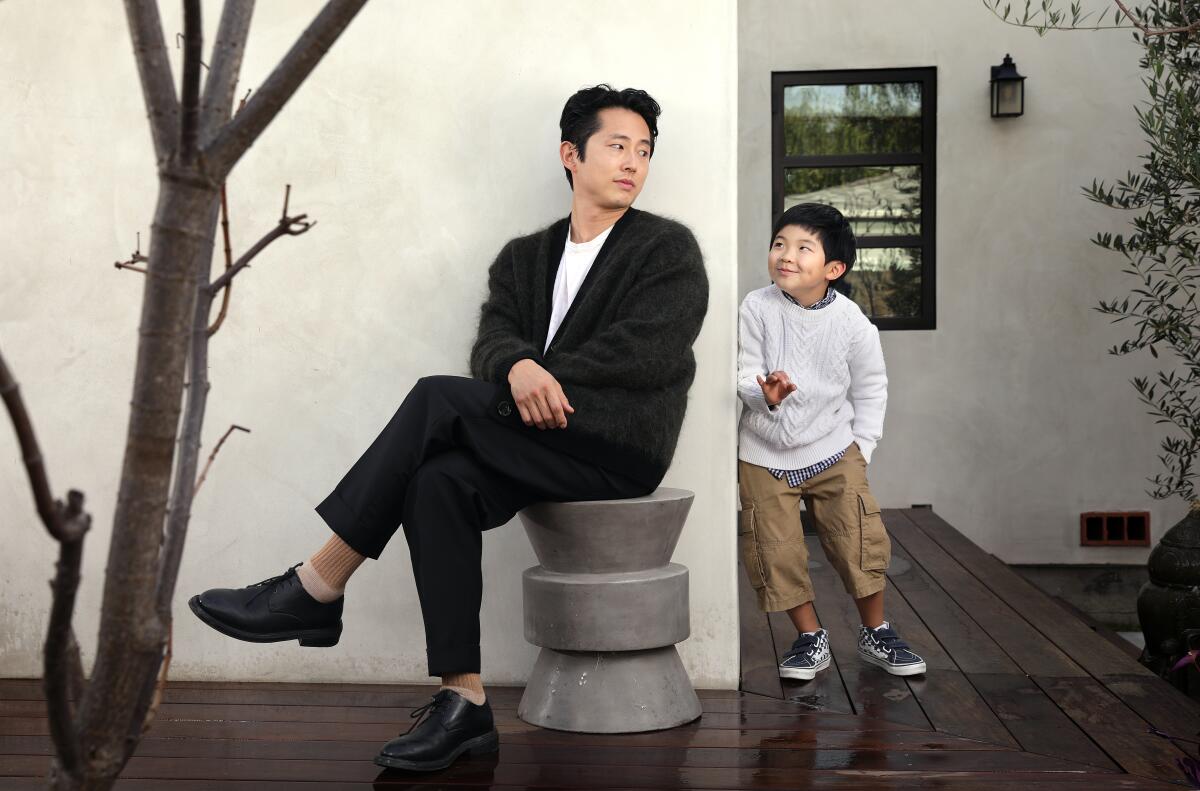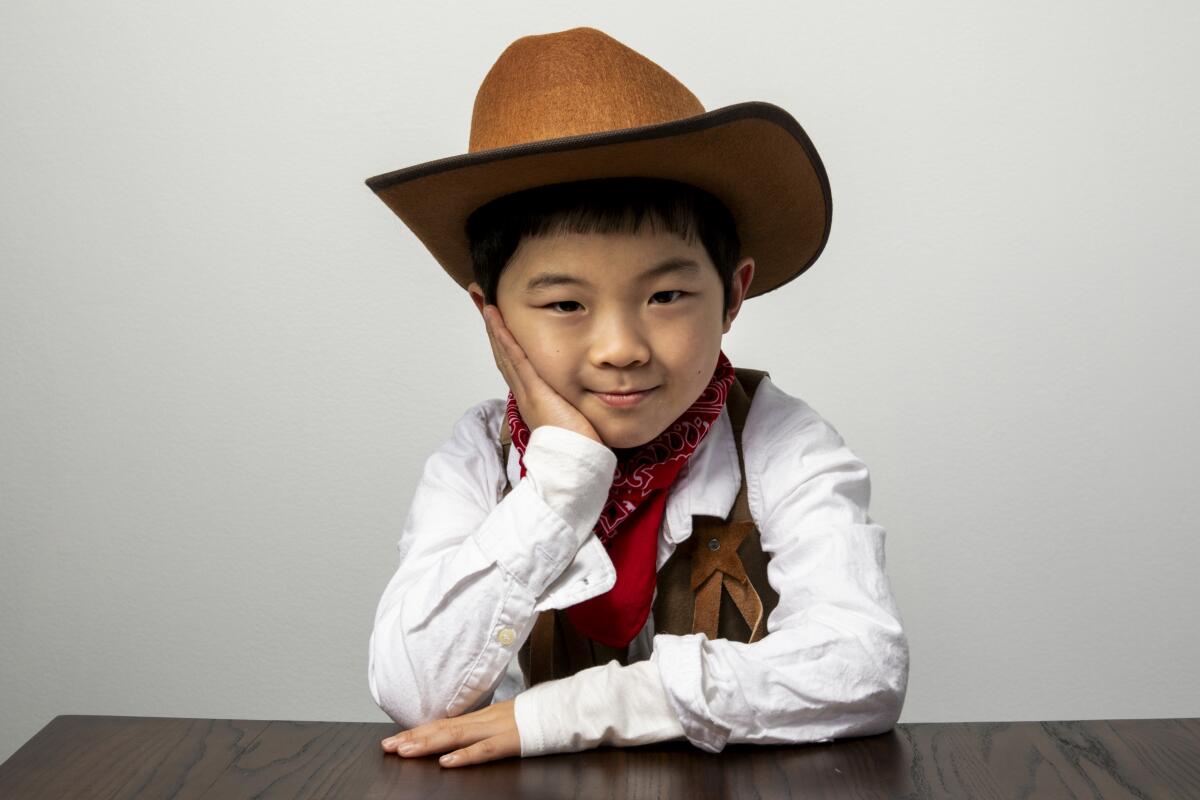Lee Isaac Chung turns inward for inspiration in ‘Minari’
- Share via
Hello! I’m Mark Olsen and welcome to the newsletter companion to “The Envelope: The Podcast,” where my cohost Yvonne Villarreal and I bring you highlights from each week’s episode.
From the Oscars to the Emmys.
Get the Envelope newsletter for exclusive awards season coverage, behind-the-scenes stories from the Envelope podcast and columnist Glenn Whipp’s must-read analysis.
You may occasionally receive promotional content from the Los Angeles Times.
For this week’s podcast, I spoke to Lee Isaac Chung, writer and director of the film “Minari.” The movie won the grand jury prize and audience award when it premiered at the 2020 Sundance Film Festival and more recently picked up nominations from the Golden Globes, the SAG Awards and the Critics Choice Awards.
The movie is drawn from Chung’s own family experiences. In the film, the Korean-American Yi family moves from California to Arkansas, as Jacob (Steven Yeun) has plans to start his own farm along with his wife, Monica (Yeri Han), and two children (Noel Cho and Alan Kim). Eventually Monica’s mother (Yuh-Jung Youn) moves from Korea to join them.
“Minari” is available in limited release in theaters and drive-ins and also via distributor A24’s virtual screening room before heading to VOD on Feb. 26.
Jen Yamato spoke to Youn, a longtime star in South Korea who recently has been appearing in her own reality TV series, about making her first movie in America. Youn related how when she first read the script, she could tell that it was drawn from Chung’s own experiences, saying, “I’ve been in this business for such a long time, and when you read a script, you can tell the difference. His story touched me. I am going to be the first audience for a script, and unless I got touched by that script, there’s no reason to do it. That’s my feeling. I thought maybe it was his story. It was so authentic.”

Amy Kaufman spoke to Kim, the little scene-stealer who was all of 7 years old when the movie was shot. On the promotional trail for the movie, he has worn a dapper series of outfits, beginning with the cowboy costume he wore to Sundance.
“It was kind of like getting an early Halloween, except no candy and no decorations,” he said. “I had the cowboy boots from the movie, and my mom was like, ‘Come on, wear this!’”
Glenn Whipp interviewed Chung and Yeun. In bringing a story of the Korean-American immigrant American experience to the screen, Yeun felt an added responsibility, as he explained: “I don’t think a movie like ‘Minari’ has been made before in this context from this country in this situation, so initially I did feel some pressure to service some larger idea of what a Korean father was, because that archetype looms large. It took me a while to come around to just accept Jacob as simply a human being. Looking back on it, I was like, ‘Man, that was harder than it needed to be.’”
And in my conversation with Chung, the filmmaker spoke about putting so much of himself and his family’s story into the script, saying, “It was very difficult in the sense that I know that my parents are private people. And I didn’t even tell them that I was making this film until I was in the editing room with it after I had shot it, because I was just so scared about what they would say.
“I really [needed] to turn inward and turn to my experiences. I wrote all these memories and I could see the stories taking shape. And what I felt was that those elements, the visual elements, could serve as like the details in this story and that I could introduce like these grander narratives of, you know, pursuing the American dream and pursuing farming and trying to be someone in the frontier, assimilation, all these different ideas to let them carry through all these little details in a way. So that was the writing process. Took me about a year to write the script. That’s a very intensely private and torturous work, I’ve got to say.”
Thanks for reading/listening/subscribing. We have lots more conversations to come, including talks with Steve McQueen for “Small Axe,” Kaley Cuoco about “The Flight Attendant,” Shaka King for “Judas and the Black Messiah” and Garrett Bradley for “Time.”
Listen to the podcast here and subscribe to “The Envelope: The Podcast” on Apple Podcasts or your podcast app of choice.

Can't get enough about awards season?
For more, follow us on Twitter at @villarrealy and @IndieFocus, and for a deeper dive into the best new movies, get Mark’s weekly Indie Focus newsletter.
If you’re enjoying this newsletter, please consider subscribing to The Times.
Feedback? We’d love to hear from you. Email us at [email protected].
Only good movies
Get the Indie Focus newsletter, Mark Olsen's weekly guide to the world of cinema.
You may occasionally receive promotional content from the Los Angeles Times.




